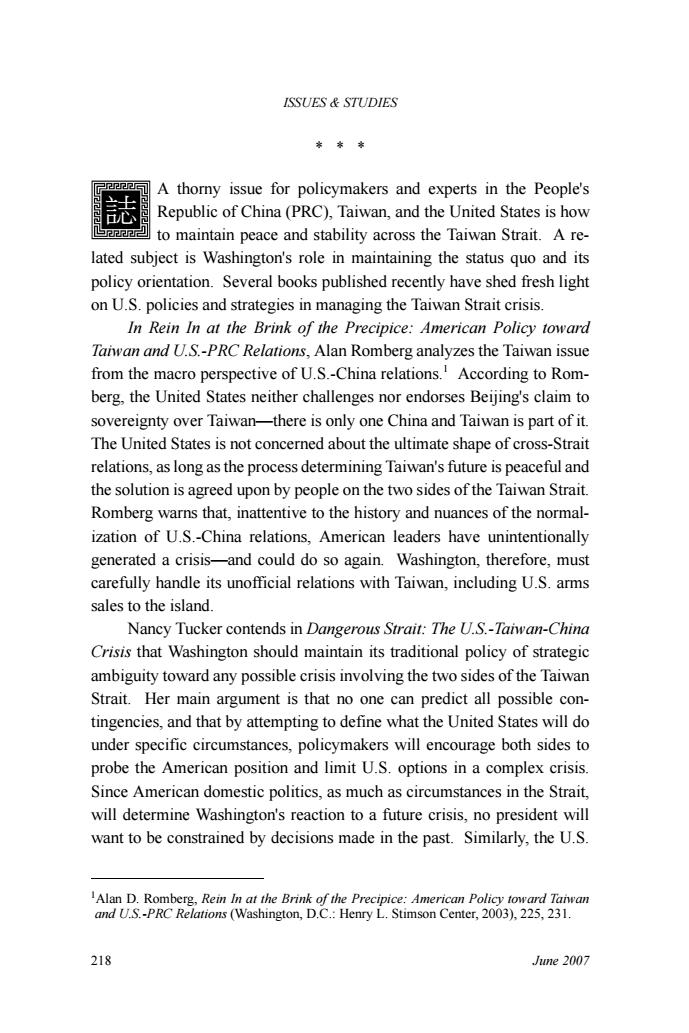正在加载图片...

ISSUES STUDIES *茶* A thorny issue for policymakers and experts in the People's Republic of China(PRC),Taiwan,and the United States is how to maintain peace and stability across the Taiwan Strait.A re- lated subject is Washington's role in maintaining the status quo and its policy orientation.Several books published recently have shed fresh light on U.S.policies and strategies in managing the Taiwan Strait crisis. In Rein In at the Brink of the Precipice:American Policy toward Taiwan and U.S.-PRC Relations,Alan Romberg analyzes the Taiwan issue from the macro perspective of U.S.-China relations.According to Rom- berg,the United States neither challenges nor endorses Beijing's claim to sovereignty over Taiwan-there is only one China and Taiwan is part of it. The United States is not concerned about the ultimate shape of cross-Strait relations,as long as the process determining Taiwan's future is peaceful and the solution is agreed upon by people on the two sides of the Taiwan Strait. Romberg warns that,inattentive to the history and nuances of the normal- ization of U.S.-China relations,American leaders have unintentionally generated a crisis-and could do so again.Washington,therefore,must carefully handle its unofficial relations with Taiwan,including U.S.arms sales to the island. Nancy Tucker contends in Dangerous Strait:The U.S.-Taiwan-China Crisis that Washington should maintain its traditional policy of strategic ambiguity toward any possible crisis involving the two sides of the Taiwan Strait.Her main argument is that no one can predict all possible con- tingencies,and that by attempting to define what the United States will do under specific circumstances,policymakers will encourage both sides to probe the American position and limit U.S.options in a complex crisis. Since American domestic politics,as much as circumstances in the Strait, will determine Washington's reaction to a future crisis,no president will want to be constrained by decisions made in the past.Similarly,the U.S. Alan D.Romberg,Rein In at the Brink of the Precipice:American Policy toward Taiwan and U.S.-PRC Relations (Washington,D.C.:Henry L.Stimson Center,2003),225,231. 218 June 2007ISSUES & STUDIES 218 June 2007 * * * A thorny issue for policymakers and experts in the People's Republic of China (PRC), Taiwan, and the United States is how to maintain peace and stability across the Taiwan Strait. A related subject is Washington's role in maintaining the status quo and its policy orientation. Several books published recently have shed fresh light on U.S. policies and strategies in managing the Taiwan Strait crisis. In Rein In at the Brink of the Precipice: American Policy toward Taiwan and U.S.-PRC Relations, Alan Romberg analyzes the Taiwan issue from the macro perspective of U.S.-China relations. 1 According to Romberg, the United States neither challenges nor endorses Beijing's claim to sovereignty over Taiwan— there is only one China and Taiwan is part of it. The United States is not concerned about the ultimate shape of cross-Strait relations, aslong asthe process determining Taiwan'sfuture is peaceful and the solution is agreed upon by people on the two sides of the Taiwan Strait. Romberg warns that, inattentive to the history and nuances of the normalization of U.S.-China relations, American leaders have unintentionally generated a crisis— and could do so again. Washington, therefore, must carefully handle its unofficial relations with Taiwan, including U.S. arms sales to the island. Nancy Tucker contends in Dangerous Strait: The U.S.-Taiwan-China Crisis that Washington should maintain its traditional policy of strategic ambiguity toward any possible crisis involving the two sides of the Taiwan Strait. Her main argument is that no one can predict all possible contingencies, and that by attempting to define what the United States will do under specific circumstances, policymakers will encourage both sides to probe the American position and limit U.S. options in a complex crisis. Since American domestic politics, as much as circumstances in the Strait, will determine Washington's reaction to a future crisis, no president will want to be constrained by decisions made in the past. Similarly, the U.S. 誌 1Alan D. Romberg, Rein In at the Brink of the Precipice: American Policy toward Taiwan and U.S.-PRC Relations (Washington, D.C.: Henry L. Stimson Center, 2003), 225, 231